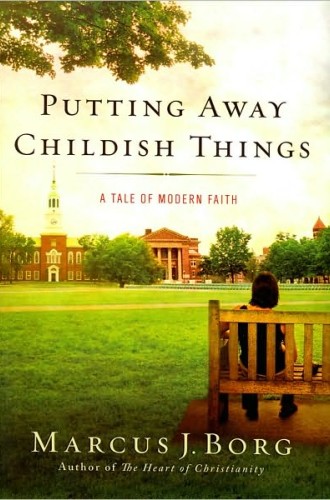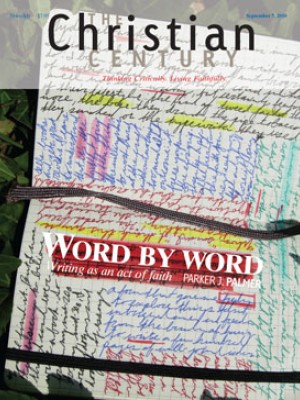A review of Putting Away Childish Things
Being the Jesus scholar that he is, Marcus Borg certainly understands the power of a story. In Putting Away Childish Things he offers up a didactic novel that explores some of the thorniest theological issues facing the Christian community. Although it's not a page-turning thriller in the mode of The Da Vinci Code, it offers Borg an alternative way to offer up his theological vision. As a first novel it should be judged not for its literary grace or dramatic sense, but according to whether Borg is able to take us deeper into his vision of progressive Christianity.
The central character in this novel is Kate Riley, a fortyish, cigarette-smoking, Guinness-drinking, red-shoe-wearing Episcopalian biblical scholar who serves as an assistant professor of religious studies at a small liberal arts college in Wisconsin. Popular with many of her students, she's also controversial, especially since gaining notoriety for publishing a book exploring the two biblical infancy narratives.
Read our latest issue or browse back issues.
In addition to Kate, the primary characters include Martin Erickson, a pipe-smoking, Glenlivet-drinking Episcopalian (formerly Lutheran) senior New Testament professor at Scudder Divinity School, who two decades earlier had been Kate's college professor and then postgraduation lover. The long-since-dissolved affair provides the sexual tension that drives part of the story. The other key figure is Erin Mattson, an evangelical student in Kate's religion and the Enlightenment class who has questions about her faith and hopes that Kate's class can help her sort them out. Although open to Kate's perspective, Erin is afraid of what might happen to the relationships she's developed with members of a campus Christian group. Other characters rounding out the story include faculty colleagues, a female Episcopal priest, other students at the college and representatives of a divinity school that seeks to hire Kate as a visiting professor.
Kate's class provides the setting for many of the didactic aspects of the story. Through the class discussions and other conversations in the story, Borg addresses issues such as creation, the identity of Jesus, and the relationship of faith and science in ways that will be familiar to readers of his other books, including The Heart of Christianity. As he does elsewhere, he uses this fictional narrative to address the relationship between factuality and truth, noting that truth can be found in metaphor and myth as well as in the facts of history and science. He briefly touches on the resurrection, but for some reason he leaves that part of the conversation hanging.
In addition to this part of the plot, there's a parallel story that deals with the relationship of faith to scholarship. Kate's book on the infancy narratives, which was pitched to a general audience and had gained her some notoriety in the media, as well as her interest in taking a one-year visiting faculty position at a divinity school, raises suspicions in the minds of her colleagues at the college that she might be abandoning the objectivity required of a religious studies scholar. Although progressive in her theology, she is a person of faith and seeks to help students wrestle with their own faith. It is this interest in bringing faith and scholarship together that draws her to teaching in a seminary, but the larger question looms—can one be a faithful scholar and also be religious?
As in his other recent books, Borg writes in a way that is friendly, inviting and engaging. The novel is a quick read and raises important questions of faith, but one is left unclear as to who exactly is putting away childish things. Is it Kate, who needs security? Martin, who hopes to rekindle a lost romance? Erin, who struggles with what might happen if she follows Kate's spiritual path and abandons not just her evangelical faith, but possibly the friendships that have come with that faith?
As one who has read many of Borg's nonfiction books, I found myself wondering about the intended audience. The narrative is sedentary, with most of the action occurring in pubs, classrooms and academic offices. I wonder too if readers will resonate with characters who teach at highly regarded colleges and seminaries, earn good salaries, eat gourmet food and drink good liquor. Will they connect with Kate and Martin, both of whom are poetry-loving Episcopalians who enjoy approaching God with set prayers? Perhaps the most sympathetic character in the book is Erin, who wrestles not just with her theology but with her friendships. However, her evangelicalism isn't developed fully enough.
Regarding Borg's view of evangelicalism, there is a side story in which Scudder Divinity School considers whether to accept funding for a chair in evangelical thought. As the committee considers the possibility, Martin reflects on possible holders of the chair and comes up with Brian McLaren, Jim Wallis and N. T. Wright. Wright is a well-regarded scholar, but neither McLaren nor Wallis has that distinction—though they, like Wright, are friends of Borg's.
Although I have reservations about the book, Borg is to be commended for taking up a new form of literature to share his theological perspective—a perspective that many have found to be generous, open and hopeful. Readers who like novels and have enjoyed his earlier books will likely enjoy this book as well.





